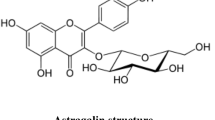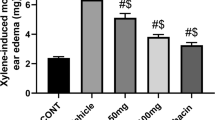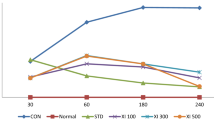Abstract
Protocatechuic acid (PCA), a phenolic compound found in teas, fruits, and vegetables, is widely recognized with its antioxidant and anti-inflammatory activities. Here, we verified the protective role of PCA on carrageenan (CGN)-induced paw edema in mice. Forty-five male Swiss albino mice were assigned into five groups: control group, CGN-injected group (1% w/v), PCA (25 mg/kg) + CGN group. PCA (50 mg/kg) + CGN group and diclofenac sodium (20 mg/kg) + CGN group. PCA and diclofenac sodium were administered orally for 5 consecutive days prior to the CGN injection. PCA pretreatment notably decreased the volume of the developed edema and alleviated the histopathological alterations induced by carrageenan. Additionally, PCA administration enhanced the cellular antioxidant capacity as demonstrated by the increased levels of catalase, superoxide dismutase, and reduced glutathione, in addition to the decreased malondialdehyde level in the edematous tissue. Interestingly, PCA administration was able significantly to suppress the developed inflammatory response upon carrageenan injection as indicated by the decreased levels and expression of pro-inflammatory cytokines and mediators including tumor necrosis factor alpha, interleukin-1 beta, interleukin-6, inducible nitric oxide synthase, nitric oxide, cyclooxygenase-II, prostaglandin E2, monocyte chemoattractant protein-1, myeloperoxidase and nuclear factor kappa B. These results collectively confirm the protective effect of PCA against carrageenan-induced paw edema owing to its antioxidant and anti-inflammatory characteristics.







Similar content being viewed by others
Data availability
Available upon request.
References
Abbate GM, Sacerdote P, Amodeo G, Mangano A, Levrini L (2016): Experimentally induced pulpal lesion and substance P expression: effect of ketoprofen—a preliminary study. Int J Dent 2016
Abdel-Daim MM, Dawood MA, Elbadawy M, Aleya L, Alkahtani S (2020) Spirulina platensis reduced oxidative damage induced by chlorpyrifos toxicity in Nile tilapia (Oreochromis niloticus). Animals 10:473
Abdel-Lateff A, Alarif WM, Algandaby MM, Alburae NA, Abdel-Naim AB (2020) Euryops arabicus displays anti-inflammatory activities in experimental models. J Ethnopharmacol 247:112278
Abdel Moneim AE (2016) Indigofera oblongifolia prevents lead acetate-induced hepatotoxicity, oxidative stress, fibrosis and apoptosis in rats. PLoS ONE 11:e0158965
Abugomaa A, Elbadawy M (2020) Olive leaf extract modulates glycerol-induced kidney and liver damage in rats. Environ Sci Pollut Res 27:22100–22111
Adegbaju OD, Otunola GA, Afolayan AJ (2020) Anti-inflammatory and cytotoxic evaluation of extracts from the flowering stage of Celosia argentea. BMC Complement Med Ther 20:1–7
Aebi H (1984) Catalase in vitro. Methods Enzymol 105:121–126
Ahmad T, Shinkafi TS, Routray I, Mahmood A, Ali S (2012) Aqueous extract of dried flower buds of Syzygium aromaticum inhibits inflammation and oxidative stress. J Basic Clin Pharm 3:323
Al Olayan EM, Aloufi AS, AlAmri OD, Ola H, Moneim AEA (2020) Protocatechuic acid mitigates cadmium-induced neurotoxicity in rats: role of oxidative stress, inflammation and apoptosis. Sci Total Environ 723:137969
Almeer RS, Hammad SF, Leheta OF, Abdel Moneim AE, Amin HK (2019) Anti-inflammatory and anti-hyperuricemic functions of two synthetic hybrid drugs with dual biological active sites. Int J Mol Sci 20:5635
Alsharif KF, Almalki AA, Al-Amer O, Mufti AH, Theyab A, Lokman MS, Ramadan SS, Almeer RS, Hafez MM, Kassab RB (2020) Oleuropein protects against lipopolysaccharide-induced sepsis and alleviates inflammatory responses in mice. IUBMB Life 72:2121–2132
Bhattacharjee N, Dua TK, Khanra R, Joardar S, Nandy A, Saha A, De Feo V, Dewanjee S (2017) Protocatechuic acid, a phenolic from Sansevieria roxburghiana leaves, suppresses diabetic cardiomyopathy via stimulating glucose metabolism, ameliorating oxidative stress, and inhibiting inflammation. Front Pharmacol 8:251
Bickel M (1993) The role of interleukin-8 in inflammation and mechanisms of regulation. J Periodontol 64:456–460
Bradley PP, Priebat DA, Christensen RD, Rothstein G (1982) Measurement of cutaneous inflammation: estimation of neutrophil content with an enzyme marker. J Investig Dermatol 78:206–209
Cichocki M, Blumczyńska J, Baer-Dubowska W (2010) Naturally occurring phenolic acids inhibit 12-O-tetradecanoylphorbol-13-acetate induced NF-κB, iNOS and COX-2 activation in mouse epidermis. Toxicology 268:118–124
Crespo I, San-Miguel B, Mauriz JL, Ortiz de Urbina JJ, Almar M, Tuñón MJ, González-Gallego J (2017) Protective effect of protocatechuic acid on TNBS-induced colitis in mice is associated with modulation of the SphK/S1P signaling pathway. Nutrients 9:288
El Okle OS, El Euony OI, Khafaga AF, Lebda MA (2018) Thiamethoxam induced hepatotoxicity and pro-carcinogenicity in rabbits via motivation of oxidative stress, inflammation, and anti-apoptotic pathway. Environ Sci Pollut Res 25:4678–4689
Ellman GL (1959) Tissue sulfhydryl groups. Arch Biochem Biophys 82:70–77
Green LC, Wagner DA, Glogowski J, Skipper PL, Wishnok JS, Tannenbaum SR (1982) Analysis of nitrate, nitrite, and [15N]nitrate in biological fluids. Anal Biochem 126:131–138
Habib SA, Suddek GM, Rahim MA, Abdelrahman RS (2021) The protective effect of protocatechuic acid on hepatotoxicity induced by cisplatin in mice. Life Sci 277:119485
Haddadi R, Rashtiani R (2020) Anti-inflammatory and anti-hyperalgesic effects of milnacipran in inflamed rats: involvement of myeloperoxidase activity, cytokines and oxidative/nitrosative stress. Inflammopharmacology 28:903–913
Harirforoosh S, Asghar W, Jamali F (2013) Adverse effects of nonsteroidal antiinflammatory drugs: an update of gastrointestinal, cardiovascular and renal complications. J Pharm Pharm Sci 16:821–847
Kadetoff D, Lampa J, Westman M, Andersson M, Kosek E (2012) Evidence of central inflammation in fibromyalgia—increased cerebrospinal fluid interleukin-8 levels. J Neuroimmunol 242:33–38
Kakkar S, Bais S (2014): A review on protocatechuic acid and its pharmacological potential. Int Sch Res Notices 2014
Kassab RB, Theyab A, Al-Ghamdy AO, Algahtani M, Mufti AH, Alsharif KF, Abdella EM, Habotta OA, Omran MM, Lokman MS (2021): Protocatechuic acid abrogates oxidative insults, inflammation, and apoptosis in liver and kidney associated with monosodium glutamate intoxication in rats. Environ Sci Pollut Res, 1–14
Khafaga AF, El-Kazaz SE, Noreldin AE (2021) Boswellia serrata suppress fipronil-induced neuronal necrosis and neurobehavioral alterations via promoted inhibition of oxidative/inflammatory/apoptotic pathways. Sci Total Environ 785:147384
Lende AB, Kshirsagar AD, Deshpande AD, Muley MM, Patil RR, Bafna PA, Naik SR (2011) Anti-inflammatory and analgesic activity of protocatechuic acid in rats and mice. Inflammopharmacology 19:255
Li Z, Liu Y, Wang F, Gao Z, Elhefny MA, Habotta OA, Moneim AEA, Kassab RB (2021) Neuroprotective effects of protocatechuic acid on sodium arsenate induced toxicity in mice: role of oxidative stress, inflammation, and apoptosis. Chem-Biol Interact 337:109392
Lokman MS, Zaafar D, Althagafi HA, Abdel Daim MM, Theyab A, Hasan Mufti A, Algahtani M, Habotta OA, Alghamdi AA, Alsharif KF (2022): Antiulcer activity of proanthocyanidins is mediated via suppression of oxidative, inflammatory, and apoptotic machineries. J Food Biochem, e14070
Medzhitov R (2008) Origin and physiological roles of inflammation. Nature 454:428–435
Min S-W, Ryu S-N, Kim D-H (2010) Anti-inflammatory effects of black rice, cyanidin-3-O-β-D-glycoside, and its metabolites, cyanidin and protocatechuic acid. Int Immunopharmacol 10:959–966
Molehin OR, Adeyanju AA, Adefegha SA, Oyeyemi AO, Idowu KA (2019): Protective mechanisms of protocatechuic acid against doxorubicin-induced nephrotoxicity in rat model. J Basic Clin Phys Pharmacol 30
Nishikimi M, Appaji N, Yagi K (1972) The occurrence of superoxide anion in the reaction of reduced phenazine methosulfate and molecular oxygen. Biochem Biophys Res Commun 46:849–854
Ohkawa H, Ohishi N, Yagi K (1979) Assay for lipid peroxides in animal tissues by thiobarbituric acid reaction. Anal Biochem 95:351–358
Oray M, Abu Samra K, Ebrahimiadib N, Meese H, Foster CS (2016) Long-term side effects of glucocorticoids. Expert Opin Drug Saf 15:457–465
Ou Z, Zhao J, Zhu L, Huang L, Ma Y, Ma C, Luo C, Zhu Z, Yuan Z, Wu J (2019) Anti-inflammatory effect and potential mechanism of betulinic acid on λ-carrageenan-induced paw edema in mice. Biomed Pharmacother 118:109347
Owumi S, Ajijola I, Agbeti O (2019) Hepatorenal protective effects of protocatechuic acid in rats administered with anticancer drug methotrexate. Hum Exp Toxicol 38:1254–1265
Ren K, Torres R (2009) Role of interleukin-1β during pain and inflammation. Brain Res Rev 60:57–64
Tanaka T, Narazaki M, Kishimoto T (2014) IL-6 in inflammation, immunity, and disease. Cold Spring Harb Perspect Biol 6:a016295
Wei M, Chu X, Jiang L, Yang X, Cai Q, Zheng C, Ci X, Guan M, Liu J, Deng X (2012) Protocatechuic acid attenuates lipolysaccharide-induced acute lung injury. Inflammation 35:1169–1178
Yadav E, Singh D, Yadav P, Verma A (2017) Attenuation of dermal wounds via downregulating oxidative stress and inflammatory markers by protocatechuic acid rich n-butanol fraction of Trianthema portulacastrum Linn. in Wistar albino rats. Biomed Pharmacother 96:86–97
Zhang H, Shang C, Tian Z, Amin HK, Kassab RB, Abdel Moneim AE, Zhang Y (2020): Diallyl disulfide suppresses inflammatory and oxidative machineries following carrageenan injection-induced paw edema in mice. Mediat Inflamm 2020
Zhang Q, de Mejia EG (2020) Protocatechuic acid attenuates adipogenesis-induced inflammation and mitochondrial dysfunction in 3T3-L1 adipocytes by regulation of AMPK pathway. J Funct Foods 69:103972
Funding
Self-funding.
Author information
Authors and Affiliations
Contributions
The author has performed all the research items.
Corresponding author
Ethics declarations
Ethical approval
All the experimental protocols, including the use of animals, were approved by the Committee of Research Ethics for Laboratory Animal Care, Umm Al-Qura University (approval no. MATRR0200).
Consent to participate
Not applicable.
Consent for publication
Consented.
Conflict of interest
The author declares no competing interests.
Additional information
Responsible Editor: Mohamed M. Abdel-Daim
Publisher's note
Springer Nature remains neutral with regard to jurisdictional claims in published maps and institutional affiliations.
Rights and permissions
About this article
Cite this article
Albarakati, A.J.A. Protocatechuic acid counteracts oxidative stress and inflammation in carrageenan-induced paw edema in mice. Environ Sci Pollut Res 29, 56393–56402 (2022). https://doi.org/10.1007/s11356-022-19688-9
Received:
Accepted:
Published:
Issue Date:
DOI: https://doi.org/10.1007/s11356-022-19688-9




